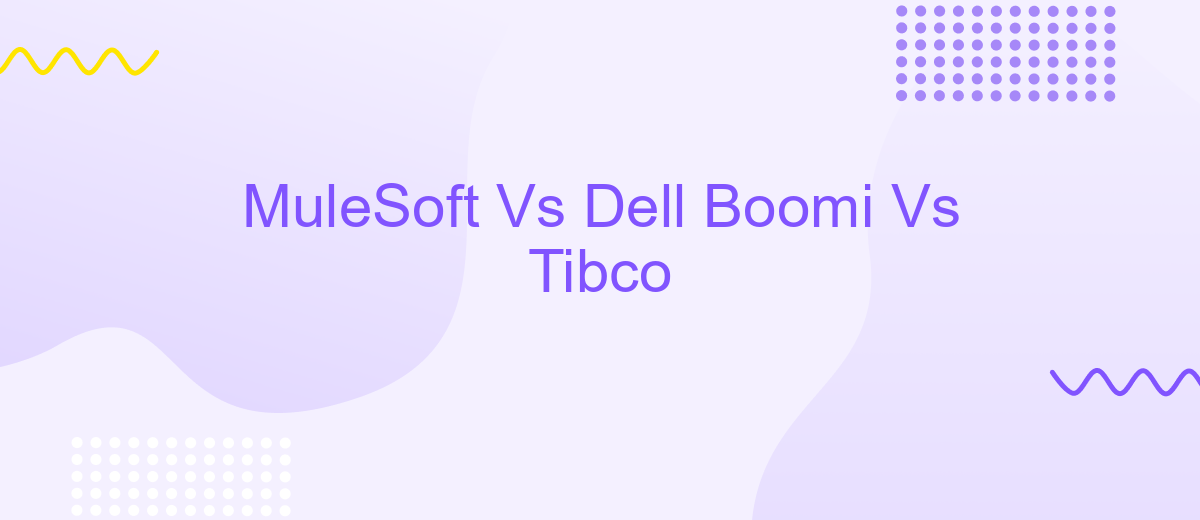MuleSoft Vs Dell Boomi Vs Tibco
In today's fast-evolving digital landscape, selecting the right integration platform is crucial for seamless business operations. MuleSoft, Dell Boomi, and Tibco are three leading contenders in this space, each offering unique features and capabilities. This article provides a comparative analysis of these platforms to help businesses make informed decisions tailored to their specific needs and integration requirements.
Introduction
In today's fast-paced digital landscape, businesses need efficient integration platforms to streamline their operations and ensure seamless data flow. MuleSoft, Dell Boomi, and Tibco are three leading solutions that cater to these needs, each offering unique features and capabilities. Choosing the right platform can significantly impact your organization's efficiency and scalability.
- MuleSoft: Known for its powerful Anypoint Platform, MuleSoft excels in API management and integration.
- Dell Boomi: A versatile cloud-native platform that simplifies complex integrations and accelerates time-to-value.
- Tibco: Offers robust data integration and analytics solutions, making it ideal for real-time data processing.
Additionally, services like ApiX-Drive can further enhance your integration strategy by automating data transfers between various applications without requiring extensive coding skills. This enables businesses to focus on core activities while ensuring data consistency and accuracy. Understanding the strengths and capabilities of each platform, along with supplementary tools like ApiX-Drive, is crucial for making an informed decision that aligns with your business goals.
Comparison of Features

MuleSoft, Dell Boomi, and Tibco each offer robust integration platforms with distinct features catering to diverse business needs. MuleSoft excels in API-led connectivity, providing a flexible and scalable solution for integrating various applications and data sources. Its Anypoint Platform is renowned for its comprehensive API management capabilities and extensive support for different protocols. Dell Boomi, on the other hand, is known for its ease of use and rapid deployment. Its low-code environment allows users to quickly build and manage integrations with minimal technical expertise, making it ideal for businesses looking for a straightforward, user-friendly solution.
Tibco stands out with its real-time data processing and advanced analytics capabilities, which are crucial for enterprises requiring immediate insights and actions. It also offers a wide range of pre-built connectors, facilitating seamless integration across various systems. Additionally, services like ApiX-Drive can complement these platforms by providing automated workflows and easy integration setups, further enhancing efficiency and reducing manual efforts. Each platform has its unique strengths, and the choice largely depends on specific business requirements and technical proficiency.
Pricing and Licensing

When comparing MuleSoft, Dell Boomi, and Tibco, pricing and licensing are crucial factors to consider. Each platform offers different pricing models, which can significantly impact your budget and scalability options.
- MuleSoft: MuleSoft operates on a subscription-based pricing model, with costs varying based on the number of users and the level of support required. Enterprise plans offer extensive features but come at a higher price point.
- Dell Boomi: Dell Boomi also follows a subscription model, with pricing tiers based on the number of integrations and connectors. The platform offers a flexible pricing structure that can accommodate businesses of all sizes.
- Tibco: Tibco provides a more traditional licensing approach, often requiring an upfront investment. Pricing can vary widely depending on the specific solutions and services you need.
For those looking for a cost-effective and flexible solution for integration, ApiX-Drive offers a viable alternative. ApiX-Drive's transparent pricing model and user-friendly interface make it an excellent choice for businesses seeking to streamline their integration processes without breaking the bank.
Customer Reviews and Market Share

Customer reviews for MuleSoft, Dell Boomi, and Tibco highlight their unique strengths and areas for improvement. MuleSoft is frequently praised for its robust API management and extensive integration capabilities. Dell Boomi, on the other hand, receives accolades for its user-friendly interface and quick deployment times. Tibco is noted for its powerful data integration and analytics features, although some users find it complex to set up initially.
Market share analysis shows that all three platforms hold significant positions in the integration market. MuleSoft, being a part of Salesforce, enjoys a strong presence in the enterprise sector. Dell Boomi, with its cloud-native architecture, appeals to businesses looking for rapid and scalable integration solutions. Tibco, with its long-standing reputation, remains a preferred choice for complex data environments.
- MuleSoft: Strong API management, extensive integration capabilities
- Dell Boomi: User-friendly, quick deployment
- Tibco: Powerful data integration, complex setup
In addition to these platforms, services like ApiX-Drive are gaining traction for their ability to simplify integration processes. ApiX-Drive offers an intuitive interface and pre-built connectors, making it easier for businesses to automate workflows without extensive technical expertise. This makes it a valuable tool for companies looking to streamline their integration efforts.
Conclusion and Recommendation
In conclusion, MuleSoft, Dell Boomi, and Tibco each offer robust integration solutions with distinct strengths. MuleSoft excels in API-led connectivity and comprehensive integration capabilities, making it a strong choice for large enterprises with complex needs. Dell Boomi stands out for its ease of use and rapid deployment, ideal for mid-sized businesses seeking quick and efficient integration. Tibco, with its strong data management and analytics capabilities, is well-suited for organizations that require deep insights and real-time data processing.
For businesses looking to streamline their integration processes further, considering a service like ApiX-Drive can be beneficial. ApiX-Drive simplifies the setup and management of integrations, offering a user-friendly interface and a wide range of pre-built connectors. This can significantly reduce the time and effort required to integrate various applications and services, complementing the capabilities of MuleSoft, Dell Boomi, and Tibco. Ultimately, the choice between these solutions should be guided by the specific needs, scale, and integration complexity of the organization.
- Automate the work of an online store or landing
- Empower through integration
- Don't spend money on programmers and integrators
- Save time by automating routine tasks
FAQ
What are the primary differences between MuleSoft, Dell Boomi, and Tibco?
Which platform is more suitable for small to mid-sized businesses?
Can these platforms integrate with legacy systems?
How do these platforms handle scalability?
What are the options for businesses that need assistance with integration setup and automation?
Apix-Drive will help optimize business processes, save you from a lot of routine tasks and unnecessary costs for automation, attracting additional specialists. Try setting up a free test connection with ApiX-Drive and see for yourself. Now you have to think about where to invest the freed time and money!


